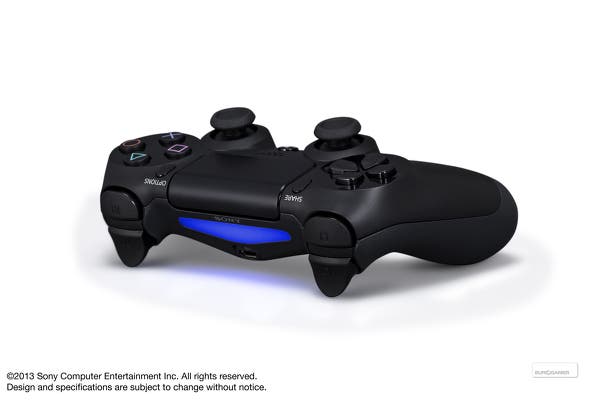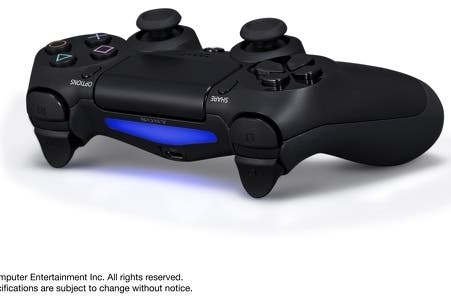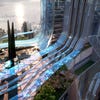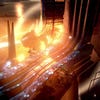PS4: PC-like architecture, 8GB RAM delight developers
"And the fact it's GDDR5 memory as well is just nuts..."
Sony's PlayStation 4 press conference was a pitch to developers as well as gamers. The console's architecture chief Mark Cerny talked more about CPUs and GPUs and teraflops than he did his own game, Knack. He described the PS4's architecture as like a PC's but "super-charged for gaming". PS4 is "a platform by game creators, for game creators", he said.
What a difference a generation makes. Cerny's run-through of the PS4's specifications marked the end of the way of the PS3, with its befuddling Cell processor. The message to developers was loud and clear: this time, PlayStation will be easy to make games for. This time, PlayStation is your friend.
So, what, then, do developers think of the PS4? Most Eurogamer spoke to, some of whom are working on secret PS4 games as we speak, expressed their delight at the ease with which they will be able to make games for Sony's next-gen console. This, for many, is the most exciting thing about the PS4 - and will, surely, result in better games.
"I thought overall it was a very good showing by Sony, revealing the important information but keeping enough back to be disruptive later in the year when others are announcing their new hardware - smart move," Nick Baynes, boss of BigBit and ex-game director at now-shuttered Split/Second and Pure developer Black Rock, says.
"The console itself is exactly what developers were hoping for. The familiar PC architecture means we can fast track our focus on the content rather than navigating the system's complexities which will surely result in better quality titles for players across the board."
Stewart Gilray, boss of Oddword developer Just Add Water (they've got a secret PS4 game in development), agrees with Baynes.
"As Mark [Cerny] said, it's closer to PC architecture. So it's easy to develop for and easier to switch to and get something up and running relatively quickly; maybe half the time it would take to get a PS3 off the ground.
"We had PS3 Stranger's Wrath running in four weeks from starting it. You could probably get it up and running in a couple weeks on PS4. Which is why the early dev kits for PS4 were basically suped-up PCs. So when you move forward, there's not a massive re-learning curve. It's not a million miles away."
James Brooksby, the boss of Strike Suit Zero developer Born Ready Games, also singles out the architecture for praise. "The PS4 reveal has everybody here at Born Ready Games rather excited - lots of interesting things came out of Wednesday's conference," he says.
"Personally, as a developer, the standout feature is the ease of which we should be able to develop for this new system compared to previous generations of console machines, which have slowed fast paced and iterative development."
The console itself is exactly what developers were hoping for
BigBit boss Nick Baynes
The PS4's PC-like architecture isn't the only new feature to have met approval from the development community. The console's impressive 8GB of GDDR5 RAM came as a surprise to many gamers - and even some developers we spoke to who have worked with PS4 dev kits.
Traditionally console dev kits contain more memory than retail units. With the PS4 dev kits containing 8GB of RAM, Sony's announcement that the retail unit would contain the same amount delighted as much as it surprised.
"8GB of GDDR5. Just for a minute can you work out what that means?" Gilray says, excited. "That's a phenomenal amount of memory. And the fact it's GDDR5 memory as well is just nuts."
Gilray isn't the only one excited. Respected game developers, including id Software programming legend John Carmack, Gearbox chief Randy Pitchford and Crytek R&D principle graphics programmer Tiago Sousa, took to Twitter to say how pleased they were with the amount of RAM in the console.
"8 GB unified mem as baseline for next tech iterations makes me very, very happy. Fun times coming ^_^," tweeted Sousa. "I can't speak freely about PS4, but now that some specs have been made public, I can say that Sony made wise engineering choices," said Carmack.
I can't speak freely about PS4, but now that some specs have been made public, I can say that Sony made wise engineering choices
programming legend John Carmack
PS4's video streaming technology, which lets you share video clips with social networks at the push of a button, and Gaikai-powered cloud functions, have sparked much debate.
Gilray isn't sure about the idea of being able to ask a friend to virtually take control of your game to complete tricky sections. "I think part of being a games player is not having someone help you, to do it yourself," he says. "The idea of somebody else using a virtual controller to take over kind of freaks me out. It's a good idea, but it kind of freaks me out."
He's more enthusiastic about being able to download games as you play them, and being able to pause and resume a game at will.
"The whole 'you can download stuff while you're playing' thing is mental," he says. "That's phenomenal news. The idea of having it so you can buy the game and get a little drop quickly, start playing the first part of the game while the rest is downloading in the background, is brilliant.
"I know we don't have the greatest broadbrand infrastructure in the world still in the UK, but what always gets me is if you've got a 4GB game to download, you've got to wait for 4GBs to download, when that might be a 20 hour game."
Baynes has already come up with an idea for PS4's cloud features.
"The built in light bar and touchpad have opened up some interesting control possibilities but the Gaikai streaming has a lot of potential for innovative game mechanics too," he says.
"Outside of the examples given during the press conference, imagine a co-op game where you can interact with and see other players in multiple, detailed, diverse environments with picture-in-picture using Gaikai streams rather than loading and rendering the different scenes locally? It's given us some very cool ideas about new ways to play that just wouldn't be possible without it so that's exciting."
"Speaking for myself, the social aspects of the PS4 sound incredibly interesting," says Brooksby. "Watching and interacting with other's gameplay streams is going to make playing and sharing really fun. I'm particularly excited at the prospect of 'blooper reels' thanks to the always-on video recording."
The machine should stick to its strengths and serve all those that love games first and foremost
Born Ready Games boss James Brooksby

During its press conference Sony mentioned in passing that PS4 would support new business models, including free-to-play and episodic, and offer self-publishing on the Store, but it didn't go into detail. For Baynes, how the PS4 will sell games is just as important as how it will run them.
"The biggest challenge for developers on PS4 is still the business model," he says. "All the games shown were still big budget blockbusters (even The Witness at three-and-a-half years in development isn't really what I'd call a low budget indie title), and so while it's very promising hearing the right noises coming out about opening up the Store to developers to self publish, and being set up for different monetisation models, it remains to be seen how competitive it is with the other open platforms out there.
"Just looking at the games on show it felt very 'old model', but I'm sure that's due to the nature of the kind of titles you need to show to get the public pumped up for new hardware. I have faith that Sony has listened to what's needed in this area - as they've listened elsewhere with the hardware."
Just looking at the games on show it felt very 'old model', but I'm sure that's due to the nature of the kind of titles you need to show to get the public pumped up for new hardware
BigBit boss Nick Baynes
Barry Keating, freelance narrative designer and game writer formerly of Sony Computer Entertainment Europe, is also interested in how PS4 will make games available to gamers. For him, free-to-play and episodic gaming are avenues through which game creators can take more risks.
"While a lot of the games on show certainly looked the part, what really interested me was the brief mention of episodic gaming and free-to-play, which I like to think will clear a space for developers to take risks with stories they might not be able to tell in AAA titles," he says.
"Don't get me wrong, AAA games do still excite me, but what really piques my interest - now more ever - is a game that makes you stop and think about what you're doing, even if it's only for a fleeting moment. I'd like to experience more of that."
For all its social and video-sharing features, the general consensus is that the PS4 is pitched squarely at the core gamer, putting games before all else. At a time when Microsoft is rumoured to be taking a more all-encompassing approach with its next Xbox, due to be revealed in April, Sony's line has divided analysts and commentators, with some questioning the wisdom of creating a potentially more expensive gamer-focused machine.
Brooksby, though, called on Sony to "avoid the temptation of turning the PS4 into a multi-purpose set top box".
"The machine should stick to its strengths and serve all those that love games first and foremost. I don't want to see too many non-video game 'opportunities' dilute what the system will do best: play games.
"And of course I want to see Sony do well, PlayStation is an important part of the gaming landscape - from what we've seen so far, it looks like everything is on the right track."
One developer left perhaps a tad underwhelmed by Sony's showing is Rich Bunn of Crazy Horse developer Nice Touch Games. Bunn, who left Sony London Studios in 2011 having worked on cancelled PS3 exclusive Eight Days and other Sony projects, said the announcement was as expected.
"I expected more power, improved interface, better social features, new dual shock, motion peripherals and Vita/tablet/phone interaction. So even though it all looks rosy, my mind wasn't really blown.
"I got the impression a little bit that Sony are trying to cover all the angles of their competitors - with things like the stereo camera (should be able to cheaply mimic some Kinect functionality) and the touchpad on the DS4, plus Vita play."
Bunn stressed the importance of bundling a headset with the PS4 - key, he believes, for Sony to avoid losing the online battle once again.
"Highlights of the show?" Bunn continues. "The Media Molecule sculpting app. The only problem is that it looked like it could easily be done this gen..."
Media Molecule's thing, whatever it is, hopefully it's a science experiment
JAW boss Stewart Gilray
The Media Molecule project left Gilray confused. "Media Molecule's thing, whatever it is, hopefully it's a science experiment. I'm not sure how it would work in a real game sense. It was a little bit odd, but we'll see how it goes."
Most agree Killzone looked the part ("amazing," says Gilray), as did Capcom's RPG project Deep Down, built using a new game engine Panta Rhei ("stunning," according to the JAW boss). Knack, directed by Cerny, came in for stick, though.
"I wouldn't have shown Knack," Gilray says. "It was like, look, this game can do thousands of physics objects. Bang! It was like, oh, really? It was a little bit twee."
Overall, though, a good start from a development point of view. "It's refreshing," Gilray says. "They could have gone ape s*** and done a stupidly-fast £500 console, which can do movie-quality CG at 1080p at 60 frames per second. But would we want that?
"I'd much rather have something, which they proposed, which is a decent system that runs at 1080p with very good graphics but still concentrates on the social aspect."






















